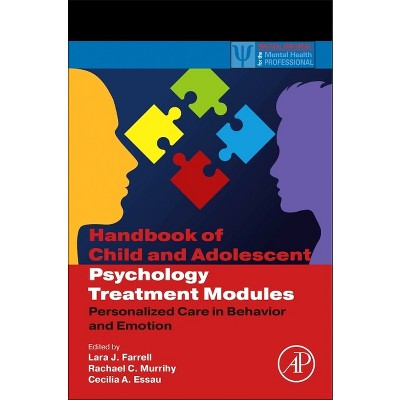Sponsored

The Palgrave Handbook of Positive Psychology and Health - by Fuschia M Sirois (Hardcover)
In Stock
Sponsored
About this item
Highlights
- This handbook brings together the two rapidly growing subfields of psychology, Positive Psychology and Health Psychology.
- About the Author: Fuschia M. Sirois is a Professor in Social and Health Psychology at Durham University, UK, and a former Canada Research Chair in Health and Well-being.
- 597 Pages
- Psychology, Applied Psychology
Description
Book Synopsis
This handbook brings together the two rapidly growing subfields of psychology, Positive Psychology and Health Psychology. It provides evidence-based and theory-driven perspectives on the potential benefits of focusing on and cultivating character strengths, positive states and traits for optimizing physical health and related outcomes in both general and medical populations. The handbook is divided into four sections, with the first three covering classic Western positive psychological domains and their relations to physical health: Hedonic well-being (Positive Emotions), Eudaimonc well-being (Meaning, Purpose and Values), and Character Strengths. The fourth section takes a novel Eastern perspective to positive states and traits by examining the role of mindfulness and self-compassion in health-related pathways and outcomes. This handbook provides an overview of how positive psychological concepts and interventions can be integrated into research and practice aimed at improving people's health. It offers a valuable resource for students and scholars of psychology, and mental and behavioural health; as well as for physicians and allied health professionals.
From the Back Cover
This handbook brings together the two rapidly growing subfields of psychology, Positive Psychology and Health Psychology. It provides evidence-based and theory-driven perspectives on the potential benefits of focusing on and cultivating character strengths, positive states and traits for optimizing physical health and related outcomes in both general and medical populations. The handbook is divided into four sections, with the first three covering classic Western positive psychological domains and their relations to physical health: Hedonic well-being (Positive Emotions), Eudaimonc well-being (Meaning, Purpose and Values), and Character Strengths. The fourth section takes a novel Eastern perspective to positive states and traits by examining the role of mindfulness and self-compassion in health-related pathways and outcomes. This handbook provides an overview of how positive psychological concepts and interventions can be integrated into research and practice aimed at improving people's health. It offers a valuable resource for students and scholars of psychology, and mental and behavioural health; as well as for physicians and allied health professionals.
Fuschia M. Sirois is a Professor in Social and Health Psychology at Durham University, UK, and a former Canada Research Chair in Health and Well-being. She is also the co-Editor in Chief of the British Journal of Health Psychology. Prof Sirois' research focuses on understanding the psychological factors and qualities that help or hinder people in their efforts to regulate their emotions, thoughts, and behaviours when dealing with life's challenges. Her research has a particular focus on how positive psychological factors, including self-compassion, meaning, and gratitude, can foster taking a strengths-based approach to self-regulation issues to improve overall health and well-being.
About the Author
Fuschia M. Sirois is a Professor in Social and Health Psychology at Durham University, UK, and a former Canada Research Chair in Health and Well-being. She is also the co-Editor in Chief of the British Journal of Health Psychology. Prof Sirois' research focuses on understanding the psychological factors and qualities that help or hinder people in their efforts to regulate their emotions, thoughts, and behaviours when dealing with life's challenges. Her research has a particular focus on how positive psychological factors, including self-compassion, meaning, and gratitude, can foster taking a strengths-based approach to self-regulation issues to improve overall health and well-being.
Shipping details
Return details
Trending Non-Fiction

















